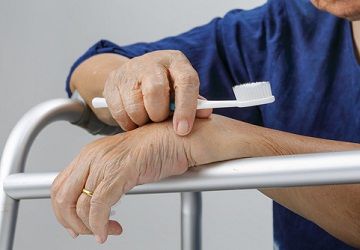Oral Health of Elderly Improved by Tailored Preventative Interventions
A new study shows that seniors who receive individualized oral health counseling tend to have better oral health outcomes. Researchers saw better outcomes with teeth and dentures. The study involved 151 home care patients. Another 118 were part of a control group.

Seniors who were in the study group that received tailored interventions showed overall oral health improvements after six months.
A new study published in Age and Ageing shows just how important it is to tailor treatment and education to individual patients, especially the elderly. In the study, elderly home care patients receiving personalized interventions related to overall oral health showed significant improvements in the cleanliness of teeth and dentures.
RELATED: More Dental Industry News
· 3Shape Debuts Wireless Version of Intraoral Scanner
· California Dental Association Reaches Settlement with Delta Dental
· Dentist Likes His Technology on the Rocks
The study is part of a larger effort called NutOrMed, which began in 2013. Investigators chose 151 elderly participants for an intervention group and 118 participants for a control group. The study began with an interview and oral clinical examination for all study participants.
Following initial interviews and examinations, everyone in the intervention group received tailored, personalized education focused on oral and denture hygiene. Participants were advised to brush their teeth at least twice daily with a fluoride-containing toothpaste, and to thoroughly clean interdental spaces, dentures, and oral mucosa each day. The control group did not receive this personalized education.
After six months, each person from both groups included in the study was re-examined and interviewed a second time. In the group that received tailored interventions, researchers found the number of plaque-covered teeth was significantly reduced. Also, denture hygiene showed a notable improvement. Both functional ability and cognitive function were associated with the reduction in the amount of plaque-covered teeth in the intervention group, but regardless of tailored intervention efforts, almost half of the teeth in people in the intervention group still had plaque even though these individuals had received personalized educational efforts.
In contrast, the control group of individuals showed a deterioration in oral health habits at the six-month follow-up. This is significant because, according to the research team, oral health notably influences a patient’s quality of life, nutrition, and general health — especially in the elderly.
The study concluded by emphasizing how it is the responsibility of all dental health providers to plan a personalized — but realistic – treatment and prevention oral health regimen for elderly home care patients.
Discover more Dentist’s Money Digest® news coverage here.